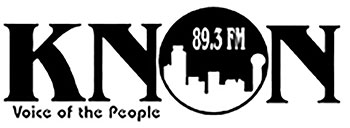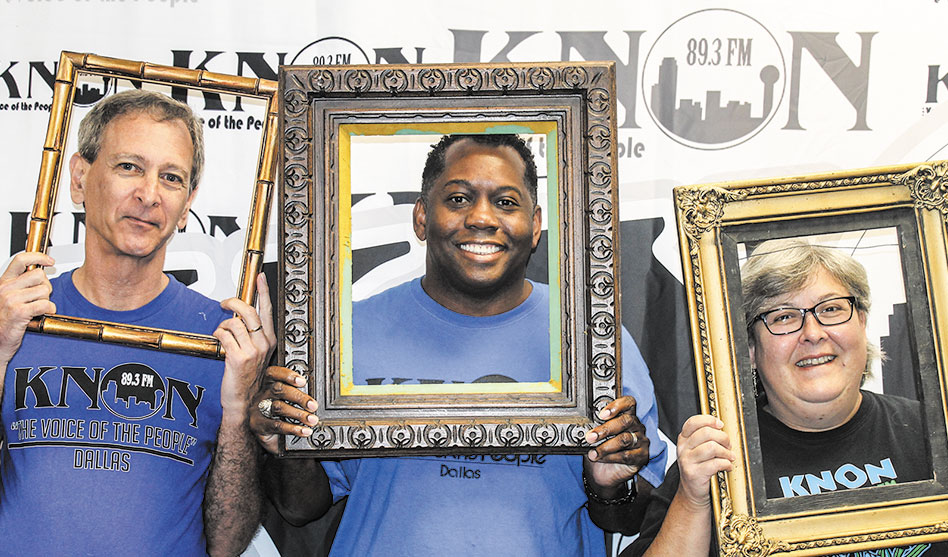Lambda Weekly cohosts, from left, David Taffet, Lerone Landis
and Patti Fink
‘Lambda Weekly’ cohosts talk about the longest-running LGBTQ radio program anywhere
TAMMYE NASH | Managing Editor
nash@dallasvoice.com
Lambda Weekly is celebrating its 40th anniversary this summer, and cohosts David Taffet, Lerone Landis and Patti Fink took a minute to share their thoughts about the program and its meaning to the LGBTQ community.
……………………
Lambda Weekly
Each Sunday, 1-2 p.m.
KNON, 89.3 FM
You can find it live-streaming at KNON. org and podcasts are available on the website under show listings.
……………………
These days Lambda Weekly gets to claim the distinction of as the longest-running LGBTQ radio program in the country. Back in 1983 when it first started, it was one of the first radio shows in the country offering “news, information and interviews of interest to the gay and lesbian community.”
The very first show hit the airwaves on July 30, 1983, with Bill Nelson, one of Dallas’ leading LGBTQ activists at the time, hosting along with a group of others. Taffet, who has more years with the program now than anyone, said this week he doesn’t remember exactly what the topics were for that first broadcast, “But I know they played music by gay and lesbian singers, and they probably discussed AIDS, which has just been renamed from GRID [Gay-Related Immune Disease] the month before.”
Over the next decade, Nelson left to run for a spot on Dallas City Council and was replaced by Bill Travis and Alonzo Duralde. Taffet joined the crew in 1990, providing a recorded travel spot each week, based on the travel articles he wrote for Dallas Voice.
 In the early 1990s, both Travis and Duralde moved to California, and Steve Walters stepped in as Lambda Weekly host. “I came down to the studio for Steve’s first show,” Taffet recalled. “He was so nervous, so I sat down at a mic, and we began chatting on air. The only thing he had planned was music, but we did half the show chatting about random topics.
In the early 1990s, both Travis and Duralde moved to California, and Steve Walters stepped in as Lambda Weekly host. “I came down to the studio for Steve’s first show,” Taffet recalled. “He was so nervous, so I sat down at a mic, and we began chatting on air. The only thing he had planned was music, but we did half the show chatting about random topics.
Kathy Tipps joined us a year or two later,” he continued. “So did a few others, like Steve Shatsky and Dave Wozniak. Kathy stuck, and she and I did the show when Steve left in about 1998.”
When Walters left, Taffet said, he announced on air that he was looking for a new cohost; Lerone Landis answered the call.
“He came by the next week, sat down at the mic, and we began chatting and had a wonderful rapport,” Taffet recalled.
Over the new six months or so, Tipps left the show, and local activist Erin Moore cohosted for a while. Then, about six months after Landis joined the show, in early 2000, Fink — Moore’s wife — was a guest on the show.
“And the three of us worked together so well that we invited her back,” Taffet said. “It’s been the three of us ever since.”
For Taffet, joining Lambda Weekly on March 1990 was the fulfillment of a childhood dream. “As a kid, I set my basement up as a TV studio, with a curtain that opened and a desk and a couch, and I used to play talk show host,” he said. But the only actual on-air experience he had at the time was as a guest on late-night radio call-in talk shows in Albany, talking about being gay, representing our school’s gay alliance with my friend Sue, who was a lesbian.”
And now, with Lambda Weekly, “I get to play talk show host for real.”
For the three volunteer co-hosts, it’s the wide range of guests they get to interact with that keeps the show fresh and interesting.
“Charo sent me a handwritten letter after she was on the show, and she said no one who ever interviewed her asked questions about how her career developed,” Taffet said. “All anyone normally ask was for her to do her coochi-coochi routine. She also told the story of walking down the street in the Castro and seeing a bar that was having a Charo lookalike contest. She entered and lost. She was a hoot to have on.”
He also always enjoyed Leslie Jordan who would “tell ridiculous stories until we had to cut him off for a break or because the show was over,” as well as actress Ruta Lee with whom he spent the show “chatting like old chums.” And local activist and therapist Candy Marcum has been invaluable as a regular guest “who always helps with pledge drives.”
For Taffet, the toughest show of his Lambda Weekly career happened the Sunday after his husband, Brian, died unexpectedly. “We just talked about his death, and people who’d listened for years stuck with me and emailed.”
Landis laughs at the idea of naming his favorite Lambda Weekly “segment,” declaring the show “too undisciplined to have segments.” But one of the most memorable shows for him was when Pastor Frank Schaefer on the show.
“He was defrocked from the United Methodist Church for officiating at his gay son’s same-sex wedding. In addition filming this episode to use as part of the pastor’s documentary.
“It was the first time I ever met a straight parent in such a prominent position that exuded that much love and, not just acceptance but embracement for the LGBT child,” Landis said. “He was genuine, brave, kind and gracious as they come. And it was a real pleasure to meet and interview him.”
Great guests and great hosts are certainly part of the reason Lambda is still around and thriving. But it’s the community that is at the core of its success, Landis said: “If we didn’t have dedicated listeners who help keep the show alive, we would not exist.”
He added, “I believe it is the incredible array of guests that draws people to the show. We’ve had just about everyone from the community who’s had something to share on the show at some point. They have rich and interesting stories, knowledge to share about our varied LGBTQ community. It’s one of the main reasons I have continued to do the show all these years.
“I have met and interviewed so many wonderful and intriguing people that I feel have enriched my own personal knowledge in a way that I would never have been able to had I just existed as part of the community. And there’s not a single other local, live media outlet in the DFW area where one can hear about LGBT topics.”
As much as they enjoy the gig, the cohosts agree that it is not always an easy job. They have developed many relationships over the years with guests and with the community, and that can make for a hard show when they are sharing bad news.
“For me, the hardest shows are those where we’ve learned that a former guest or someone in our KNON or Lambda Weekly family has died,” Fink said. “It’s also incredibly painful when we focus a show on the active discrimination happening against our community, especially right now with the deplorable hate and vicious ignorant attacks against trans kids, and especially in Texas.
“It’s difficult to say which shows had the most impact,” she continued, “and perhaps the most important thing about Lambda Weekly is our consistent presence and ‘visibility’ for 40 years. I remember a listener writing to us many years ago before we began simulcasting online to share that as a student at Baylor in Waco, he’d drive up I-35 to Hillsboro on Sunday nights and park somewhere just to listen to our show and then drive back to Waco. Because it was literally the only gay thing anywhere for him at that time and Hillsboro was the first place he could get the radio signal.
“Young people in East Texas would write to us to share how important our show was for them, that they’d count on us as a lifeline. I’ve been in the grocery store or out somewhere and been approached by listeners who recognize my voice and want to tell me how much the show means to them.
That’s the impact we really cannot quantify, it’s so unseen on radio.”
Look for complete Q&As with each cohost at DallasVoice.com.

